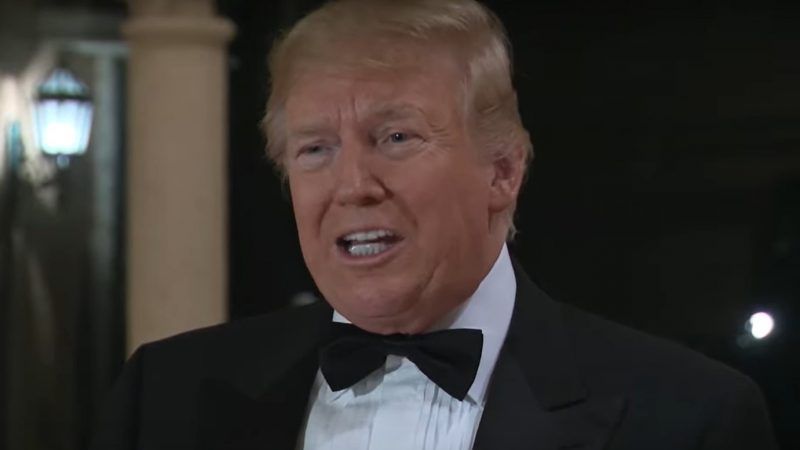FDA Ban on Flavored E-Cigarettes Is Expected to Exempt Open-System E-Liquids
In response to intense opposition from vapers and the industry, the Trump administration has recalibrated its plan.

It looks like the pending federal ban on flavored e-cigarettes will exempt e-liquids used in refillable vaporizers and apply only to cartridges, the type of product that is most popular with teenagers. The New York Times reports that the new restrictions, which the Food and Drug Administration (FDA) is expected to announce soon, will allow cartridges such as Juul-compatible pods only in tobacco and menthol flavors but will not cover the fluids that vapers use in open systems. According to the Times, menthol will be exempted because it is a popular cigarette flavor, accounting for 35 percent of the market, but is not favored by underage vapers.
That compromise represents a significant recalibration of a proposed policy that provoked intense opposition from adult consumers and the vaping industry, including thousands of small businesses across the country. The response led Donald Trump's political advisers to warn that a flavor ban could alienate voters who were otherwise inclined to support the president, potentially threatening his re-election.
The FDA originally planned to ban all e-liquid flavors but tobacco. The main justification for that policy was the recent surge in vaping by minors, who overwhelmingly prefer mint, fruit, candy, and dessert flavors. But that is also true of adults who have switched from smoking to vaping, many of whom say flavor variety was important in that transition. The targeted flavors account for almost all sales at vape shops that cater to adults, and it was expected that a blanket ban would drive some vapers back to smoking, a far more dangerous habit, while deterring current smokers from quitting.
On New Year's Eve, Trump said the flavor restrictions will be announced "very shortly," although he suggested they will be temporary. "We'll be taking it off—the flavors—for a period of time, certain flavors," he told reporters at his Mar-a-Lago resort in Palm Beach, Florida. "We're going to protect our families, we're going to protect the children, and we're going to protect the industry. Hopefully, if everything's safe, they're going to be going very quickly back onto the market."
Trump alluded to the recent outbreak of vaping-related lung illnesses, which are strongly associated with cannabis extracts containing vitamin E acetate, an additive that began showing up in black-market THC cartridges in 2019. "People have died from this, they've died from vaping," he said. "We think we understand why. But we're doing a very exhaustive examination, and hopefully everything will be back on the market very, very shortly."
Trump noted the harm-reducing potential of legal e-cigarettes, which do not contain vitamin E acetate and deliver nicotine without tobacco or combustion products. "Vaping can be good," he said. "[With] e-cigarettes, you stop smoking. If you can stop smoking, that's a big advantage."
Trump's attitude toward e-cigarettes seems to have evolved since he first announced a flavor ban in September, saying "we are going to have to do something" about the increase in underage consumption. "While I like the Vaping alternative to Cigarettes, we need to make sure this alternative is SAFE for ALL!" he said on Twitter two days later. "Let's get counterfeits off the market, and keep young children from Vaping!"
By November, Trump was beginning to view the FDA ban as an example of potentially damaging overregulation. "Will be meeting with representatives of the Vaping industry, together with medical professionals and individual state representatives, to come up with an acceptable solution to the Vaping and E-cigarette dilemma," he tweeted on November 11. "Children's health & safety, together with jobs, will be a focus!"
At that meeting, held on November 22, Trump was receptive to the argument that excessive legal restrictions could drive nicotine vapers toward potentially hazardous black-market alternatives. "If you don't give it to them," he said, "it's going to come here illegally." An unnamed "senior administration official" told The Washington Post the president initially acted based on one-sided information about vaping. "He didn't know much about the issue and was just doing it for Melania and Ivanka," the official said, referring to the president's wife and daughter.
Whatever happens with the flavor restrictions, the vaping industry faces another imminent threat. Under a 2016 rule, all e-liquid and device manufacturers that want to keep their products on the market must submit costly, time-intensive applications to the FDA by May 12. That requirement is expected to eliminate the vast majority of current products, including e-liquids produced by small manufacturers and vape shops.
It remains to be seen whether Trump's new concern about the health of the vaping industry will translate into less onerous requirements for FDA approval. "Our next focus will be on ensuring that the Trump administration recognizes the need to reform the FDA's regulatory system for these products," Gregory Conley, president of the American Vaping Association, told me in November, when it seemed that Trump was reconsidering the flavor ban. "If President Trump wants to win in 2020, mere inaction on this issue is not enough."


Show Comments (40)